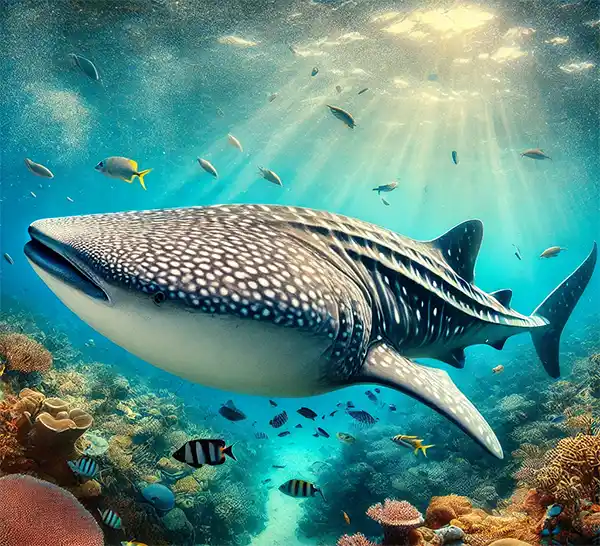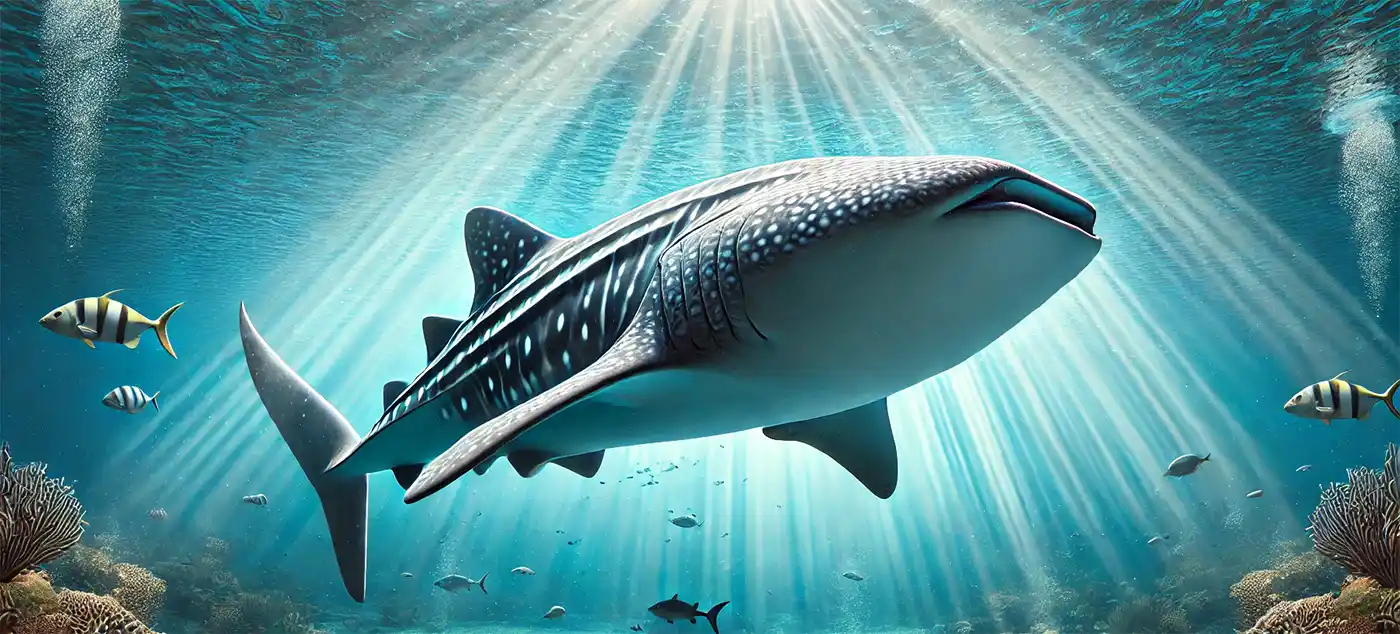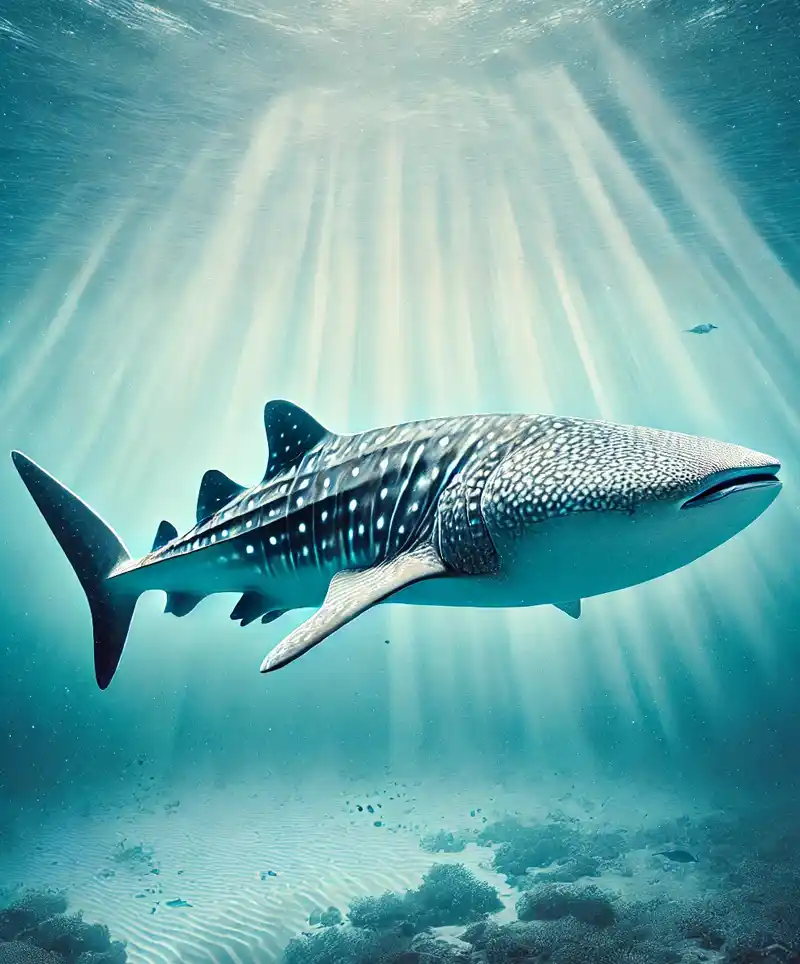Celebrating the Ocean's Gentle Giants
When it comes to awe-inspiring sea creatures, whale sharks are at the top of the list—both literally and figuratively. As the largest fish in the sea, these gentle giants deserve a day of celebration, and that's exactly what International Whale Shark Day is for. Held annually on August 30th, this day is a chance to appreciate these colossal creatures, raise awareness about their conservation, and marvel at the wonders of marine life.
Whale Shark 101
Whale sharks are an oceanic enigma, floating effortlessly through the waters as they defy the typical “shark” image we all have. Picture this: a gentle giant with a mouth wide enough to engulf a school bus (well, almost), but instead, it sips on plankton, one of the smallest organisms in the sea. These behemoths can grow up to 40 feet long and weigh as much as 20.6 tons, making them the largest fish in the ocean. Despite their size, whale sharks have a peaceful demeanor, often described as the "gentle giants" of the ocean.
Their distinct patterns of spots and stripes, unique to each individual like a fingerprint, make them easy to identify. These patterns not only serve as camouflage but also help scientists track and study them. Whale sharks have tiny teeth, about 3,000 of them, but they don't use them for eating. Instead, they filter-feed, gulping down water and filtering out plankton and small fish with their gill rakers, which act like a sieve.
 Interestingly, whale sharks can live up to 70-100 years, making them some of the ocean's longest-lived inhabitants. They prefer warm tropical waters and are often found in regions like the Philippines, Mexico, and the Maldives, where the waters are rich in plankton. Whale sharks also have the unique ability to dive to depths of up to 1,800 meters, showing off their adaptability in various marine environments. Despite their size and capabilities, these gentle giants are still vulnerable to threats like overfishing and habitat destruction, making conservation efforts vital for their survival.
Interestingly, whale sharks can live up to 70-100 years, making them some of the ocean's longest-lived inhabitants. They prefer warm tropical waters and are often found in regions like the Philippines, Mexico, and the Maldives, where the waters are rich in plankton. Whale sharks also have the unique ability to dive to depths of up to 1,800 meters, showing off their adaptability in various marine environments. Despite their size and capabilities, these gentle giants are still vulnerable to threats like overfishing and habitat destruction, making conservation efforts vital for their survival.
A Gentle Giant’s Diet
Contrary to what Hollywood might have you believe about sharks, whale sharks are the ocean's vegetarians—or at least the closest you can get in the shark world. They feed primarily on plankton, krill, and small fish, which they filter from the water using their massive mouths. And when we say massive, we mean it—these creatures can have mouths up to five feet wide. Yet, despite their huge size, whale sharks pose no threat to humans. In fact, they’re known to be quite docile, often allowing swimmers to hitch a ride or at least swim alongside them for a spell.
Imagine, if you will, an all-you-can-eat buffet that you don’t even have to chew. Just open wide, swim through, and let the food come to you. That’s life for a whale shark. It’s a feeding strategy that involves gulping down copious amounts of water and filtering out the delicious bits—like a giant, floating vacuum cleaner that only picks up the good stuff.
Whale sharks are slow movers, cruising along at a leisurely pace of around 3 miles per hour. This may not sound impressive, but when you’re the size of a bus, there’s no need to rush. They prefer warm, tropical waters, which is why they can be found in places like the Gulf of Mexico, the Indian Ocean, and the Maldives. These slow-paced travelers are also known for their impressive migration patterns, covering thousands of miles each year. Think of it as the ultimate summer vacation road trip—minus the road and the traffic jams.
Gentle Giants at Risk
Despite their gentle nature and plant-based diet, whale sharks are not without their challenges. They are currently listed as endangered by the International Union for Conservation of Nature (IUCN), facing threats from habitat loss, fishing, and boat strikes. Like many of their marine counterparts, whale sharks are also affected by the ever-increasing problem of ocean pollution. Plastic debris, chemical pollutants, and climate change all pose significant threats to their survival.
International Whale Shark Day is a reminder of the importance of protecting these magnificent creatures and their habitats. Conservation efforts include implementing marine protected areas, regulating fishing practices, and promoting eco-friendly tourism. Because let's face it, the ocean would be a much duller place without these polka-dotted behemoths swimming around.

Fun Whale Shark Facts
- Polka-Dot Identification: Every whale shark has a unique pattern of spots on its skin. Scientists use these patterns to identify individual sharks, much like fingerprints in humans. If only taking attendance in school was this cool.
- Long Life, Big Growth: Whale sharks can live for up to 70-100 years. They don't reach maturity until they’re around 30 years old, which might make them the slowest puberty cases in the animal kingdom.
- Deep Divers: These giants aren’t afraid to dive deep. They have been recorded diving as deep as 4,600 feet (1,400 meters). That’s deeper than the Empire State Building is tall!
- Shark Babies: Whale sharks give birth to live young. A female whale shark can carry hundreds of eggs, but the pups (baby sharks) are born fully formed and ready to swim. Imagine a nursery the size of a swimming pool—full of baby whale sharks!
- Not-So-Fearsome Teeth: Whale sharks have thousands of tiny teeth, but they don’t use them to eat. In fact, it’s believed these teeth serve little to no purpose. It’s like having a toolbox but only using it to store snacks.
How to Celebrate International Whale Shark Day
- Go Diving or Snorkeling: If you’re lucky enough to be near whale shark hotspots like the Philippines, Mexico, or Australia, consider going on a guided whale shark swim. Remember to respect their space and follow eco-tourism guidelines.
- Support Conservation Efforts: Donate to organizations dedicated to marine conservation or participate in beach clean-ups to help reduce ocean pollution.
- Spread the Word: Use social media to share facts about whale sharks and raise awareness about their endangered status. Use hashtags like #InternationalWhaleSharkDay and #SaveTheWhaleSharks.
- Watch a Documentary: Dive into the world of whale sharks from the comfort of your couch. Many nature documentaries highlight the lives of these incredible creatures and the challenges they face.
 Whale sharks remind us that not everything huge and toothy in the ocean is out to get us. These peaceful giants demonstrate the incredible diversity and wonder of marine life. By celebrating International Whale Shark Day, we not only show our appreciation for these unique creatures but also reaffirm our commitment to protecting the oceans they call home. So, whether you're swimming alongside one or simply marveling from afar, remember to give a little nod to the whale shark—the ocean’s friendliest giant.
Whale sharks remind us that not everything huge and toothy in the ocean is out to get us. These peaceful giants demonstrate the incredible diversity and wonder of marine life. By celebrating International Whale Shark Day, we not only show our appreciation for these unique creatures but also reaffirm our commitment to protecting the oceans they call home. So, whether you're swimming alongside one or simply marveling from afar, remember to give a little nod to the whale shark—the ocean’s friendliest giant.
Please Share our Content






 Interestingly, whale sharks can live up to 70-100 years, making them some of the ocean's longest-lived inhabitants. They prefer warm tropical waters and are often found in regions like the Philippines, Mexico, and the Maldives, where the waters are rich in plankton. Whale sharks also have the unique ability to dive to depths of up to 1,800 meters, showing off their adaptability in various marine environments. Despite their size and capabilities, these gentle giants are still vulnerable to threats like overfishing and habitat destruction, making conservation efforts vital for their survival.
Interestingly, whale sharks can live up to 70-100 years, making them some of the ocean's longest-lived inhabitants. They prefer warm tropical waters and are often found in regions like the Philippines, Mexico, and the Maldives, where the waters are rich in plankton. Whale sharks also have the unique ability to dive to depths of up to 1,800 meters, showing off their adaptability in various marine environments. Despite their size and capabilities, these gentle giants are still vulnerable to threats like overfishing and habitat destruction, making conservation efforts vital for their survival.
 Whale sharks remind us that not everything huge and toothy in the ocean is out to get us. These peaceful giants demonstrate the incredible diversity and wonder of marine life. By celebrating International Whale Shark Day, we not only show our appreciation for these unique creatures but also reaffirm our commitment to protecting the oceans they call home. So, whether you're swimming alongside one or simply marveling from afar, remember to give a little nod to the whale shark—the ocean’s friendliest giant.
Whale sharks remind us that not everything huge and toothy in the ocean is out to get us. These peaceful giants demonstrate the incredible diversity and wonder of marine life. By celebrating International Whale Shark Day, we not only show our appreciation for these unique creatures but also reaffirm our commitment to protecting the oceans they call home. So, whether you're swimming alongside one or simply marveling from afar, remember to give a little nod to the whale shark—the ocean’s friendliest giant.








 "Sláinte!" is a traditional Irish expression used as a toast, equivalent to "Cheers!" in English.
"Sláinte!" is a traditional Irish expression used as a toast, equivalent to "Cheers!" in English.